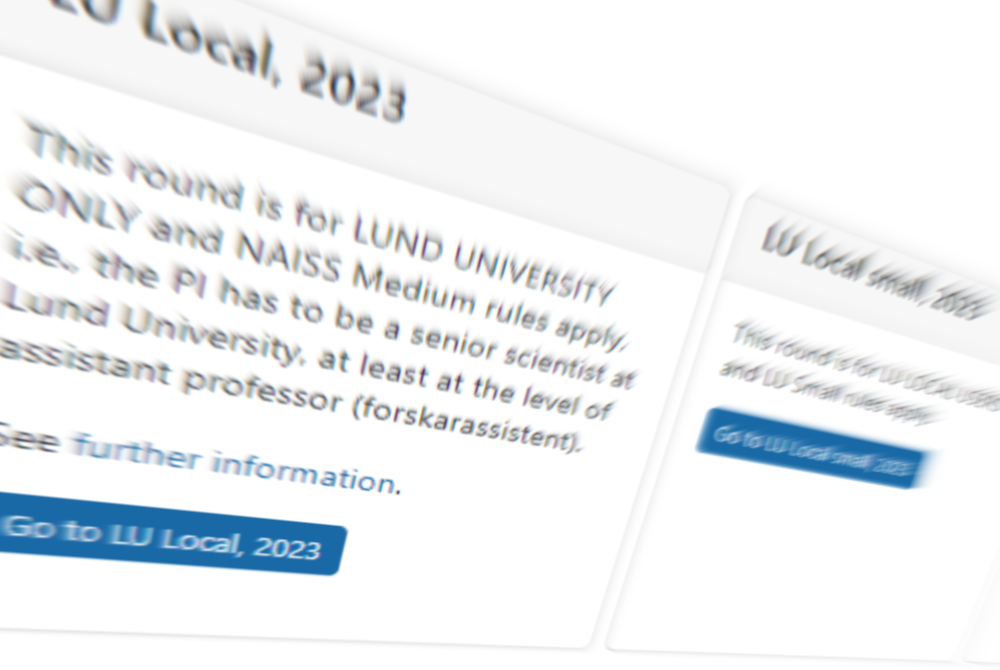How to apply for a project
Projects are resource allocations
Access to LUNARC resources are managed via so-called projects, which are allocations of time for computation or allocation of storage space. Note that storage is only intended to be used in connection with computation and not as just a place to put data.
Allocation projects should not be confused with scientific projects, which means that several scientific projects, for example, different PhD projects, may be using the resources within one allocation. In fact, it is preferred that all the computational needs of a research group are collected in one allocation and any user should only be member of one compute allocation. The same goes for storage allocations connected to compute projects.
Projects come in different flavours
Projects are divided by the type of resource allocated, compute or storage. Projectes are also divided by the size of the allocation with upper limits for each type, small, medium, or large. Large allocations require a special evaluation and are only offered on the systems provided by the national infrastructure, NAISS. Access to LUNARC resources are handled as small and medium allocations.
For a project of type medium, the PI must be a senior person, which in academia means at least associate senior lecturer (assistant professor). PhD students and postdocs may apply for a project of type small.
Computations involving sensitive data have to be performed on special resources and the corresponding projects at LUNARC are labelled as L-SENS for the first generation of resorurces and as COSMOS-SENS for the new generation.
Procedure
LUNARC offers resources through "Compute Rounds" and "Storage Rounds". A compute project is all that is needed to get access to LUNARC, but a storage project also requires a compute project, because the storage is only intended to be used in connection with computation.
The LUNARC compute rounds are called "LU Local" and "LU Local small" and the storage rounds have the names "LU Medium Storage" and "LU Small Storage".
PhD students and postdocs at Lund University may apply for "small" projects, but for the "normal"/"medium" rounds, the applicant has to be a "senior scientist", at least at the level of "assistant professor (forskarassistent)", or rather "associate senior lecturer", which the more common junior position today. People holding positions as researchers or research engineers are also counted as "senior scientists".
All projects are handled through the Swedish User and Project Repository (SUPR), https://supr.naiss.se. The following links will lead directly to the respective rounds:
- Compute: LU Local
- Compute: LU Local small
- Compute: LU COSMOS-SENS (Medium rules apply)
- Storage: LU Medium Storage
- Storage: LU Small Storage
If you are not currently logged in in SUPR, you will be asked to this. SUPR offers a number of ways to login. For employees at Lund University, the most convenient is "Login using SWAMID", which simply means using the Lucat-ID.
If it is your first proposal ever, the choice should be Alternative 1, create a proposal from scratch. Provide a title and proceed with "Create New Proposal".
If the intention is to submit a proposal similar to a previous one, the choice should be Alternative 2. Pick the previous proposal from the list and click on "Clone Proposal". This will lead to a new page where there is a choice between making the new project a continuation of the previous one or not. If it is a renewal, because the old project is about to expire, the answer should be "Yes". Then proceed by clicking on "Create New Proposal".
The proposal requires basic information about the project as well as a choice of resource and the requested allocation. Forms to fill in will appear, when the corresponding buttons are pressed. It is also possible to add members to the project, using "Add Co-Investigator", which will start with search fields to find people already registered in SUPR, but after searching it is also possible to create a new person, if not the right person is found. Note that it is also possible to add members after the project has been accepted, either directly by the PI (or proxy) or by accepting a membership request from the member-to-be.
The PI can designate a co-investigator as proxy, which means that the PI can delegate the proposal and project management to another person.
If it is a cloned proposal, information from the old proposal will be already filled in, but it can be edited.
If something is missing in the proposal, SUPR will tell you when you try to submit.

